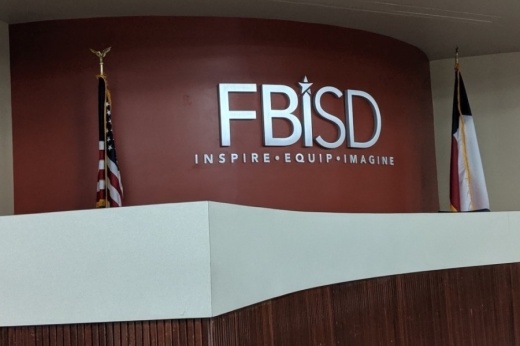The one-year temporary property tax increase would generate up to $35.1 million for FY 2025-26, helping the district fund staff retention bonuses and maintain a 90-day reserve fund. Additionally, most FBISD taxpayers would still see a net decrease in their tax bills if two bills pass in the ongoing 89th Texas Legislature, Chief Financial Officer Bryan Guinn said at the May 5 agenda review meeting.
“We are at a critical time where we need to narrow our focus and not chase so many options, because we really don't have a lot of time left before we have to lawfully adopt the budget,” Guinn said.
What it means
FBISD leaders are proposing the district’s 2025-26 tax rate be $1.0090 per $100 property valuation—a $0.07 increase over last year’s rate of $0.9693, Guinn said. For the average homeowner of a $429,909 home, this would be an annual tax bill increase of $200, or about $17 per month.
The district would be able to adopt this new rate without voter approval, as FBISD was allowed the use of seven “disaster pennies” after Hurricane Beryl last July. The pennies are additional property tax rate increments allowed by the state to recover from natural disasters, Guinn said.
Even with this proposed tax increase, the net tax burden could still decrease for most taxpayers due to two bills that propose a tax $0.03 tax rate compression for school districts and $40,000 increase in the homestead exemption, Guinn said.
However, House Bill 8, which proposes the tax compression, has yet to leave the House, and Senate Bill 4, which proposed the homestead exemption, has yet to receive a vote from the House, according to Texas Legislature Online.
If approved, the use of disaster pennies would temporarily increase the tax rate but expire after one year, Guinn said.The big picture
Guinn attributed FBISD’s expected revenue shortfall to missed enrollment projections, a loss in student health services funding due to a federal audit and employee benefit contributions.
Since January, the district has planned $10.6 million in expenditure cuts for FY 2025-26, including administrative layoffs, software savings and budget adjustments, Guinn said. However, the ratio of students to teachers per classroom won’t increase.
“We want to make sure that any decisions that we make here as it relates to the budget has minimal impact on students, on learning, on teaching,” Guinn said.
Another bill, House Bill 2, would generate approximately $30.8 million in new revenue for the district in the 2025-26 school year if passed in its current form. This translates to roughly a 3% raise for teachers and 2% for other staff, Guinn said.
However, Guinn said these figures remain preliminary and dependent on final legislative language and FBISD board approval. Additionally, the bill has yet to undergo a Senate vote before arriving at Gov. Greg Abbott’s desk for approval, according to Texas Legislature Online.
“[To] any staff members listening to the thought that we may get raises next year, ... do not take that money to the bank,” Guinn said. “We still are pending the outcome of the legislative session, as well as board action.”
Even with the HB 2 funds and cost reductions, the district would still face a $7.8 million deficit that would require the district to dip into its reserve fund, causing it to fall short of its 90-day operating reserve requirement for the following 2026-27 school year, Guinn said.
Using the seven “disaster pennies” as a one-time tax increase could raise an additional $35.1 million in revenue, Guinn said.
The impact
Future annual staff raises would be funded through HB 2, while retention bonuses would be funded by disaster pennies and wouldn’t carry over to future years, Guinn said.
If all seven disaster pennies are used, a $500 retention supplement would result in a reserve fund balance increase of $21.6 million and 99 reserve days, while a $1,000 supplement would result in a fund balance increase of $16.1 million and 97 reserve days, Guinn said.
Guinn said the extra funds would give the district flexibility to:
- Maintain its AA+ bond rating, meaning the district is considered a safe investment for lenders
- Avoid further cuts and protect existing programs
- Fund one-time staff retention supplements
- Cushion potential student enrollment declines from the state’s private school voucher program, which was signed by Abbott May 3
- Launch or support initiatives like premier programming
Trustee Angie Hanan encouraged board members and the community to reach out directly to legislators to voice support for HB 2, especially as the end-of-session deadline nears on June 2.
However, after the end of a regular session, Abbott may call a special session to cover specific topics, according to the legislature website.
FBISD’s next formal budget workshop is scheduled for May 19 before the regular board meeting where trustees will vote on the public hearing date for the tax rate, according to board documents.
The final adoption for the tax rate and budget is slated for June 23, Guinn said.





